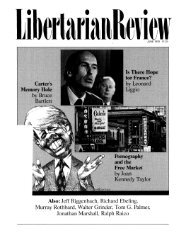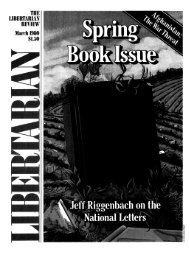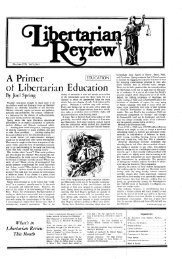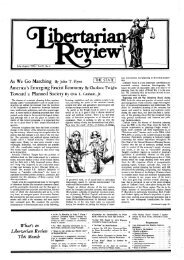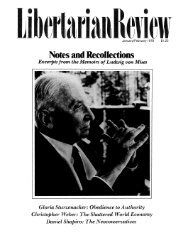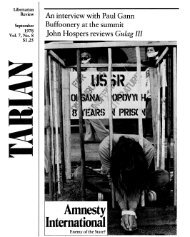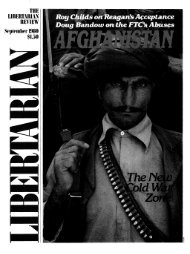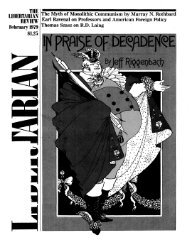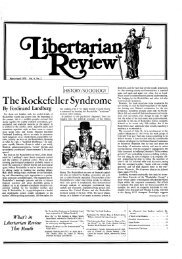The Libertarian Review July 1978 - Libertarianism.org
The Libertarian Review July 1978 - Libertarianism.org
The Libertarian Review July 1978 - Libertarianism.org
You also want an ePaper? Increase the reach of your titles
YUMPU automatically turns print PDFs into web optimized ePapers that Google loves.
I Editorials<strong>The</strong> African labyrinthIn January, 1976, the Democratic-controlled Congressvoted its opposition to the proposals of PresidentFord and Secretary Kissinger that the UnitedStates intervene further in the Angolan civil war.(Ford had already been making extensive secret useof the CIA in that country). Even more significant,however, was the vote cast against the administration's interventionismby a majority of House republicans. (<strong>The</strong>day before the vote, the <strong>Libertarian</strong> Luncheon Club onCapitol Holl sponsored a talk, mainly to Republicanlegislative aides, on the proposed U. S. intervention inAngola, and acquainted them with some of the history ofU.S. relations with the tribal-political movements there, aswell as the zig-zags of U.S. policies, and the policyreasons against American intervention.)Today, however, President Carter's demand that theCongress repeal its limitations on executive interventionismis being supported by the Republican congressionalleadership. <strong>The</strong> Republicans are claiming that theoriginal limitation was merely a partisan gesture to embarassa Republican president. <strong>The</strong>y see intervention inAfrica as a crucial issue on which to divide the Democraticparty, and especially to divide the president and Congress.But the issues involved here are much more importantthan mere election year politics. Reversal of the congressionalban on presidential intervention in African tribalpolitics would open the way for more long-term Americanquagmires, for more disasters like the one we experiencedrecently in Southeast Asia.When the United States first began to meddle in centralAfrica in 1960, the objective was to maintain the strengthof the central government of the Congo-a governmentwhich had been created by Western colonialism. Many ofthe major Congolese tribes were unwilling to be ruled fromthe colonial capital, however, notably those in the copperprovince of Katanga and the diamond province of KasaLLike nearby Zambia, these two provinces depend fortransportation on routes which go through Angola. Moreover,the populations of these provinces belong to thesame tribes that inhabit neighboring Angola and Zambia:<strong>The</strong> dominant Lunda tribe of Katanga also has large elementsin eastern Angola as well as in northwest Zambia.<strong>The</strong> former Katanga gendarmes who invaded Shabaprovince (the new name for Katanga) this spring, as well aslast spring, are members of the Lunda tribe, and are led bythe National Front for the Liberation of the Congo,founded by Nathanael Mbumba in June 1968. Mbumba, aLunda leader educated by American Methodists, <strong>org</strong>anizedthe Katanga gendarmes (as they still call themselves) aftertheir last exile in 1967. <strong>The</strong>y first went into exile in Angolain 1963 when Moise Tshombe, premier of Katanga, wasforced by the U.N. and the United States to accept centralCongo control of his province. <strong>The</strong>y returned in 1964when Tshombe became premier of the Congo, but were exiledagain in November 1965 when Tshombe (who laterdied in an Algerian prison) was overthrown by JosephMobutu, a protege of CIA Deputy Director FrankCarlucci.Larry Devlin, the CIA station chief in Leopoldville from1960 to 1973, also aided Mobutu in this and other politicalcoups. Five years ago Devlin became Congo representativefor Maurice Tempelsman, the U.S. diamond dealer whohelped Mobutu establish financial control over the rebelliousKasai province and now heads the marketing of Kasaidiamonds. Tempelsman also has copper concessions in Katanga.According to western diplomatic sources, the CIA isstill in charge of Mobutu's personal bodyguard and provideshim with information on his opponents.Mobutu is not the only one receiving foreign assistance.He has claimed that Belgian officials have'encouragedMbumba's Katanga gendarmes and have given recognitionto their representatives. <strong>The</strong>re is some indication thatFrench financial interests are seeking dominance in Zairethrough the Rothschild-controlled Pennaroyo company.<strong>The</strong> Anglo-Belgian interests which formerly dominated theCongo have now been mainly nationalized. (<strong>The</strong> 1973"Zaireanization" of foreign owned plantations and commercialcompanies was widely hailed as the beginning ofthe creation of a native capitalist middle class. <strong>The</strong> propertieswere turned over to friends of Mobutu, and the shortagesand inflation which have followed have createdwidespread public opposition complete with clashes andexecutions.) <strong>The</strong> Zaire government owes about $4 billionto foreign, mainly American, banks, and has defaulted oninterest payments. American banks are desperate to keepKatanga-whose rich copper mines account for 65 percentof the country's foreign exchange-under Zaire's control.But the situation is still more complicated. Since 1960,the CIA and Mobutu have been aiding Holden Roberto,the head of the Angola Bakongo tribe (which makes itshome in western Zaire, in Congo-Brazzaville, and innorthern Angola) and also of FNLA, the National Front of-the Liberation of Angola. At the same time, Roberto hasalso received aid from Communist China, which once ledsome American journalists to claim he was a communistout to destroy western civilization (more recently, ofcourse, receiving aid from Communist China has beentaken to mean one is a defender of the Free World and aprotector of Western civilization).<strong>The</strong> Katanga gendarmes view Mobutu and Roberto astheir main enemies-especially since Mobutu's army,trained by the North Koreans, massacred the Katanganswho returned to the Congo under Mobutu's amnesty offer.And in opposing Mobutu, the Katanga gendarmes are alliedwith their traditional associates: the fierce Tshokwe4<strong>Libertarian</strong> <strong>Review</strong>



